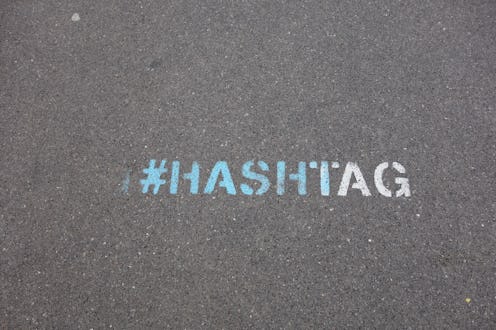Books
The Top 8 Bookish Hashtags of 2014

Social media has the ability to put a microscope on some of the biggest cultural trends in the country and in the world. Often "hashtag activisim" is criticized for its lazy approach to fixing societal problems, but this year has shown that the term can be spun for the good. For readers, 2014 was a massive year in hashtag campaigning and using Twitter to talk about issues in the literature and publishing industry. We saw huge successes, with hashtags that opened our eyes to underrepresented, diverse narratives and that combated sexism on bookshelves. Another hashtag used satire to fight against misogyny. And people say that the Internet and social media are killing our communication skills.
But, hey, us book nerds know how to have a little fun, too. There were also hashtag games and challenges that helped us exercise our punning muscles or see what we could do in 140 characters or less. (Though we will never be as good at this Twitter game as J.K. Rowling, it doesn't matter how hard we try.) No matter if they were for a good cause or just for a good laugh, these eight literary hashtags were the best 2014 had to offer.
#WeNeedDiverseBooks
The We Need Diverse Books organization, started with the #WeNeedDiverseBooks hashtag, was a tornado through the children's and young adult publishing industry this year, shaking up the status quo and ensuring diversity on the priority list for literature. Started by Ellen Oh and quickly joined by loads of authors and members of the publishing industry, the campaign hoped to give voice to underrepresented people and narratives. It began after the planned panel of "luminaries" in children's litertature for Book Expo America's BookCon was all white men, literally. And now the We Need Diverse Books IndieGoGo campaign is a massive success, having raised close to $180,000, surpassing its $100,000 goal.
Clearly, We Need Diverse Books is one of those viral successes that will be in the cultural and literary landscape for years to come, not just in 2014.
#SensibleYA
It seems like 2014 was the year to criticize young adult literature, and the older generations that read it. But YA fans didn't take this backlash lying down; they fought back in defense of their favorite books and rallied against the idea that YA wasn't for adults and wasn't "real" literature at all. The #SensibleYA hashtag is a great satire in this vein. Inspired by YA author Carrie Mesrobian’s blog on Teen Librarian Toolbox, Kirsten Hubbard, Michelle Schusterman, and Kate Hart started the hashtag.
Mesrobian's blog was a response to critics saying that her characters made poor decisions. She, rightly, said that she is not endorsing those actions, just presenting them. In fact, if you want to read about people making good decisions, she said, you can read a health textbook or a pamphlet in the waiting room of the guidance counselor. This started YA readers changing their characters' actions to be "acceptable" or "sensible" and tweeting them out with #SensibleYA.
#ScaryStoriesin5Words
Halloween was a good time on Twitter for lit lovers. Taking a cue from famous experimental literature like Six Word Memoirs, Twitters users were tasked with the challenge of creating a scary story in only five words, using the #ScaryStoriesin5Words hashtag.
Some users took this as an opportunity to tease themselves or others with funny submissions...
... and others really stepped up to create mini horror stories.
#SpookierBooks
In case you didn't get enough spooks for Halloween, the end of October also had the #SpookierBooks hashtag. The challenge? Change a word or two and made a classic novel into something a whole lot more horrifying.
#FoodieFiction
That same concept was taken in a new direction with the #FoodieFiction hashtag, that had your favorite books take a more delicious twist.
#IReadEverywhere
Want to showcase your absolute love of reading? This was the hashtag for you. Sure, we all read on the subway and in bed before falling asleep, but the #IReadEverywhere hashtag started by the New York Public Library showcases some of the more unique places we open a book.
Even our favorite celebs got their tweets in:
#ReaderGate
To understand the satirical #ReaderGate hashtag, you have to (at least somewhat) understand GamerGate. Twitter users appropriated the arguments of GamerGate about video games and gaming journalists and turns them to ask the question, "What if we made these same arguments against literature?" In short: What if literary criticism never, ever took into account the societal or political context in which it was written, and instead relied on the very basics of what is written, in a vacuum? Oh, and with the fun addition of misogyny.
The hashtag showed examples of this, and as true satire does, it was so on-point that it got right to the heart of the troubles behind the original, GamerGate.
#ReadWomen2014
Self-explanatory: Pick up a book by a woman this year. Know that the classics aren't just by men like Hemingway and Fitzgerald, they're by women like Woolf, Plath, and the Brontes. Joanna Walsh started the #ReadWomen2014 hashtag to combat sexism in publishing and give female authors the attention they deserve in an industry that can often be like an old boys club.
Hopefully we'll be seeing #ReadWomen2015, #ReadWomen2016, #ReadWomen2017 ... until we don't have to say "read women" in order to ensure female writers are getting the same respect as their male counterparts.
Image: Petit_louis/Flickr; Giphy; ReadWomen2014/Facebook